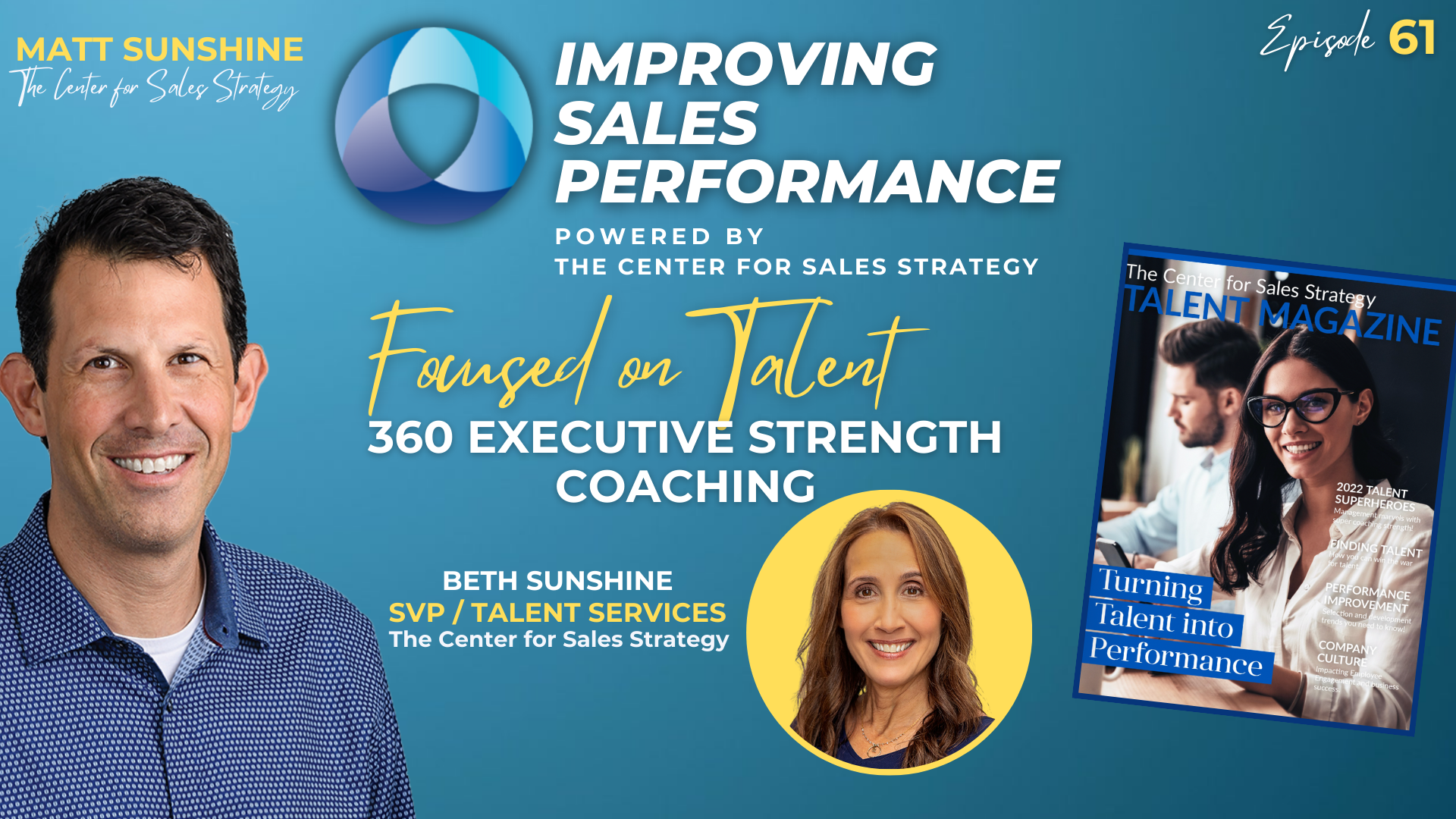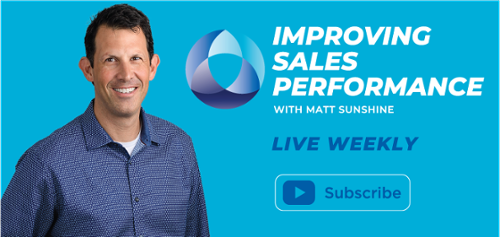
In this episode, we’re wrapping up our season-long coverage of The Center for Sales Strategy’s latest Talent Magazine.
Today, we’re taking some time to discuss a group of people who too often get the short end of the “development stick.” That’s right; we’re talking about leaders.
Joining Matt to uncover the ways in which leaders can most effectively tap into their innate strengths is Beth Sunshine.
Beth makes so many awesome points, like:
- How 360 Executive Coaching allows leaders to see both where they are using their strengths as well as areas where they could stand to develop their strengths even more.
- Why, even if you have raw talent, you still need to focus on developing it into an actual skill.
- And, finally, why leaders who aren’t intentionally focusing on their strengths are missing out on opportunities to develop not only themselves but the teams they manage as well.
Focusing on Weaknesses=10% Improvement. Focusing on Strengths=10X Improvement
“All right, so let's talk about the 360 Executive Coaching,” Matt says, starting the conversation. “And the reason we’re focusing on it is really to discuss how important it is for leaders to be aware of their innate strengths.
“So, starting there, why should leaders spend time homing in on what their natural talents are?
Beth says, “I'd say the main reason is that if they're not intentional about focusing on their strengths, they're going to miss a big opportunity, an opportunity to grow, an opportunity to be happier at work.
“Often, counterintuitively, when considering a person's strengths and weaknesses, people have a much longer list of weaknesses than they do strengths. The list of things we can innately do at a level of true excellence is pretty short, and the problem is that human nature leads us to take our strengths for granted and focus on our weaknesses.
“And the catch is, when we focus on growing in an area of strength, we can get as much as 10 times better, while the same amount of time and effort focused on an area of weakness is only going to lead to marginal improvements, like 10% improvement. So, it's really a conundrum.
“We're inclined to focus our efforts in an area that offers very little ROI for our hard work, and the areas where we can grow exponentially, we often ignore.
“Yeah,” Matt says. “That makes a lot of sense. And, if you think about it, you can certainly see where the logic of focusing on what you're not good at started.
“It's like, when you're a little kid, if you're really good at a subject, you ‘test out of it,’ right? It’s like, ‘Oh, Beth, you're really good at math. You test out of that, but you're not really good at history, so we're going to put you in more history.’ That thinking kind of makes you believe that's what you should do.”
“That's right,” Beth says. “And in school, the goal was proficiency. They needed everyone to hit that average level of proficiency. But what we're talking about, and what I think business leaders want, is much more than proficiency.
“They want to reach a level of excellence.”
“So, with 360 Executive Coaching,” Matt says. “This is focused on where you have the talents that would suggest that you should be doing better in certain areas.”
Ask Yourself, “What’s a Regular Job Task I Perform that Makes Time Fly?”
“What strategies or methods can business leaders use to identify their natural talents?” Matt asks. “Even if they're unsure of how to leverage them effectively, what can they be doing?”
“Well, the best way for a business leader, or really anyone, to identify their natural talents is to use a validated talent assessment that aligns with their job role,” Beth says.
“There are tons of good assessments out there. I think most of your listeners have probably heard of Strength Finders as an example. There are bunches of them.
“Those assessments give people a really broad understanding of their strengths, but they're very one-size-fits-all in nature, meaning that they measure the very same things in everyone regardless of role.
“We know the things that make somebody a great pediatric nurse is totally different than what will make you great at being a college professor.
“So, I would recommend using an assessment that's specifically designed to focus on the behaviors that lead to excellence in your specific job role.
“And if you don't have access to an assessment if that's not available to you, there are some less scientific methods you can use to identify your strengths.
“For example, you would want to think about something that draws you in. So, what activity do you find yourself looking forward to? What’s something that you love to do and, with practice, you find you can achieve a level of excellence?
“When you do that thing, it makes time fly. Performing that favorite task also makes you feel really strong. And when you're doing something that uses an innate strength, at the end of the day, even when you're exhausted from working so hard, you feel strong.
“I would consider those things that make you feel good, that you shine in.
“What I heard you saying was look for talent assessments for the job that you're doing. That would be the number one, very best thing you could do.
“Next, what you said reminded me of this quote, ‘strengths give you strength.’ That's not scientific, but if you don't have a validated talent assessment, that would be a good way of understanding your innate talents.
“I definitely do not have a strength in building PowerPoint presentations. If I have a to-do list, I will find any excuse to do almost anything before I build the PowerPoint presentation because I don't think I'm very good at it and it just saps me of my energy, right? So, is that a good example of what's not a strength?”
“It's a great example,” Beth says. “Like I said earlier, when you're called on to use a strength heavily during the day, at the end of it, even if you're tired, you feel strong.
“A weakness is very much the same. When you use a weakness, when you're called on to use that weakness often or for a long, extended period of time, it makes you feel weak.
“So, you know it doesn't draw you in, it's not something that makes time fly, and, when you're done, you don't feel strong, you feel weak. Building a PowerPoint, for you, would go in the weakness category. And if you were to pick something where you could really use your strengths, grow exponentially and become one of the best in the world, you probably don't want to pick that.”
Skills Are the Outcome of Applying and Developing Your Talents
“How do natural talents align with other leadership skills and competencies?” Matt asks. “How can a business leader strike a balance between leveraging their natural talents and developing the necessary skills that they need for top performance?”
“That's a great question,” Beth says. “Just because you have a talent for something doesn't actually mean that you've developed the skill for it yet.
“So, I would think of talent as the foundation for success, and then leadership skills are built on top of that foundation. Another way to say that is talent is your raw ability. Skills are the outcome of applying your talent and developing that innate raw ability into something really great.
“When I’m first explaining it, I usually put it in terms that really easy to understand, like baseball. If you were to think about the natural talents necessary to become a standout star in baseball, you might list things like great hand-eye coordination, arm strength, speed, and endurance.
“You can spot a kid who demonstrates all of those behaviors, but that doesn't mean they're going to be great at baseball the first time you bring them on your team and you have them play. They need skill development to make that happen.
“So, they would need to practice hitting and pitching and fielding and catching and all of those things. Because they have those innate talents, though, we know that, with intense practice, they can grow their skills like hitting and running by up to 10 times.
“It's just a matter of putting in the hours, putting in the work.
“Talent and skills in business leadership is really the same thing. So, you know I work with a lot of sales managers. I'll use sales managers as an example. The best sales managers they have raw ability. They have the raw innate talent to connect with people, to earn their trust, to communicate effectively, often making complex information really easy to understand. They're demonstrating empathy, and coaching others.
“But, you know, when someone's first hired into sales management, they've never done it before. They're not going to be great at it. They can just apply intentional effort and practice to make those talents come to life. And when they do, they develop the skills to train new sellers, skills to run great one-on-one focus meetings. But when that raw talent is developed? That’s when you get those skills.”
360 Executive Coaching Points to Those Areas Where Strengths Could Be Better Utilized
Matt asks, “How does someone understanding their talents help business leaders in building and leading high-performing teams? What impact does that have on overall team dynamics as well as overall productivity?”
“Huge impact,” Beth says. “To develop a high-performing team, you need a leader who can really do four things. They need to recruit, select, develop and engage top performers consistently all of the time. That takes more than just talent.
“Talent is just the ticket to admission. To achieve the highest levels of productivity and success over the long term, the leader has to be really keyed in, completely focused all the time.
“Management is complex. There are so many responsibilities on the manager's plate, so many bells ringing all the time that need an immediate response. I think it's extremely difficult for them to maintain a consistent focus on all of their strengths all of the time.
“One of my favorite things to do is the 360 Executive Coaching that you had talked about earlier, because it gives leaders the opportunity to see where they are consistently using their strengths and celebrate those successes. Then it points them to the areas where they have that natural ability, but they could use a little more intentional effort, a little more intentional focus.
“When we have a strength that is not being maximized, when we find that gap between what we could be doing and what we are doing, that's the magic. We can capitalize on that opportunity and get the big boost in growth.”
“Yeah,” Matt says. “When you do the 360 Executive Coaching, you do the 360 before and after. Is that correct?”
“Well, it depends on what someone signs up for,” Beth says. “We have a very short version where we don't do that, and then we have a longer, extended version where we do. It's just such an amazing thing...to look at what you're working with, identify the little things you're going to add to your priority list, and then to see growth in the end.”
“Right,” Matt says. “because that way you get to see the improvement that you had. I know that if I went through something like that, I'd get a lot of satisfaction at seeing, ‘Okay, I was here; I worked on these things. My team has responded. We're doing better.’”





